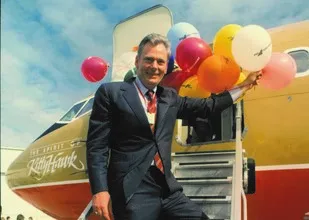
Chain-smoking Kelleher changed the US airline industry
Jan 07, 2019

Chain-smoking Kelleher transformed the US airline industry through his innovative approach as co-founder and CEO of Southwest Airlines. Known for his unconventional leadership style and casual demeanor, he prioritized low fares and customer service, making air travel accessible to a broader audience. Kelleher implemented a no-frills business model that focused on efficiency, quick turnarounds, and point-to-point routes, challenging the traditional hub-and-spoke system. His emphasis on employee satisfaction and a fun corporate culture fostered strong loyalty among staff and customers alike. This disruptive strategy not only reshaped Southwest Airlines but also influenced the entire airline industry, paving the way for low-cost carriers.
In the annals of U.S. aviation history, few figures stand out as prominently as Kelleher, the chain-smoking entrepreneur who revolutionized the airline industry. His unconventional approach to business transformed the way airlines operate, making air travel more accessible and affordable for millions of Americans. This article delves into Kelleher's impact on the airline industry, highlighting key innovations and strategies that reshaped air travel.
The Rise of Southwest Airlines
Kelleher co-founded Southwest Airlines in 1967, a time when the airline industry was dominated by major carriers with rigid pricing structures. His vision was to create an airline that offered low fares and high-frequency service on short-haul routes. Kelleher believed that air travel should be as commonplace as driving, and he set out to make that a reality.
Innovative Business Model
One of Kelleher's most significant contributions to the airline industry was the introduction of a no-frills business model. By eliminating unnecessary amenities and focusing on core services, Southwest Airlines was able to keep operational costs low. This approach allowed the airline to offer competitive fares, attracting budget-conscious travelers and fundamentally altering consumer expectations in the industry.
Impact of Deregulation
The Airline Deregulation Act of 1978 was a pivotal moment for the U.S. airline industry, and Kelleher was at the forefront of this transformation. Deregulation allowed airlines to set their own fares and routes, leading to increased competition and lower prices for consumers. Kelleher embraced this new landscape, expanding Southwest's operations rapidly and positioning the airline as a leader in the market.
Cultural Shift in the Airline Industry
Kelleher's leadership style was characterized by a strong emphasis on company culture and employee satisfaction. He believed that happy employees would lead to happy customers, a philosophy that became a cornerstone of Southwest Airlines' operations. This focus on culture not only set Southwest apart from its competitors but also inspired other airlines to adopt similar practices, fostering a more customer-friendly atmosphere across the industry.
Embracing Technology
As technology began to play an increasingly important role in the airline industry, Kelleher was quick to adapt. He recognized the potential of online booking systems and invested in technology that streamlined operations. This early adoption of technology not only improved efficiency but also enhanced the customer experience, making it easier for travelers to book flights and manage their itineraries.
Table: Key Innovations Introduced by Kelleher
| Innovation | Description | Impact |
|---|---|---|
| No-Frills Business Model | Elimination of unnecessary services to reduce costs. | Lower fares and increased accessibility for consumers. |
| Deregulation Strategy | Expansion into new markets following the Airline Deregulation Act. | Increased competition and market share for Southwest. |
| Employee-Centric Culture | Focus on employee satisfaction and engagement. | Higher customer satisfaction and brand loyalty. |
| Technology Adoption | Investment in online booking and operational technology. | Enhanced efficiency and improved customer experience. |
The Legacy of Kelleher
Kelleher's influence on the airline industry extends far beyond his tenure at Southwest Airlines. His innovative approach set a new standard for customer service and operational efficiency that many airlines strive to emulate today. Kelleher's legacy is a testament to the power of bold ideas and the impact of leadership on an entire industry.
Conclusion
In summary, chain-smoking Kelleher not only changed the U.S. airline industry but also redefined the very essence of air travel. His commitment to low fares, employee satisfaction, and innovative practices has left an indelible mark on the aviation landscape. As the airline industry continues to evolve, Kelleher's principles remain relevant, serving as a guiding light for future entrepreneurs and industry leaders. The transformation he spearheaded has made air travel a viable option for millions, ensuring that the skies remain accessible for all.
Related Articles

Explore Thailand: The Best Islands to Visit for Paradise, Adventure, and Relaxation

The Ultimate Guide to the Best Islands in Thailand for Your Next Getaway

Do babies need passports? How to get a passport for a newborn

How to get a U.S. passport fast: here’s how to expedite the process

What is Mobile Passport Control: 5 reasons why you should use it

SENTRI vs. Global Entry: A detailed guide

Do you need a passport to go to the Bahamas? Let’s find out

Do you need a passport to go to Mexico? A detailed guide

Do you need a passport to go to Canada? We got the answer

Do You Need a Passport for a Cruise: An Essential Travel Guide

Booster Seat Requirements: All the Rules to Follow in Your Rental Car

What Are the World’s Most Powerful Passports, and How Does Yours Rank?

How to Take a Passport Photo at Home: A Helpful Guide

You've got to have heart! Southwest's new livery

Your opinion: Should water be free on low cost carriers?

Young women bolder than guys as solo travellers
